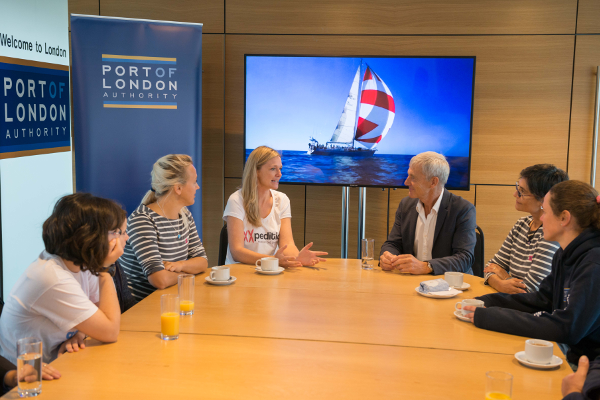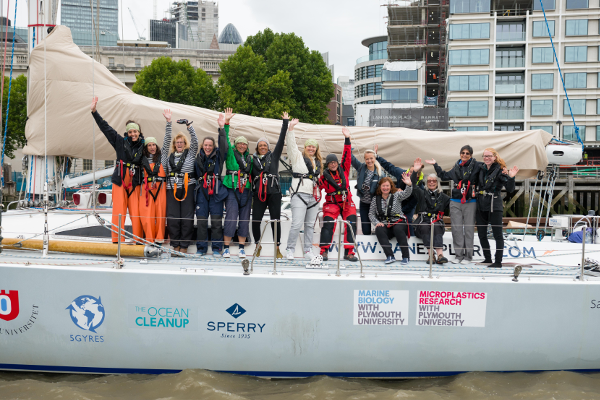30.08.2017
Testing the water
ROUND BRITAIN ALL-WOMEN YACHTING CREW
UNDERTAKES SCIENTIFIC SAMPLING ON THE THAMES
 A team of women sailing around Britain to sample the UK’s waters for micro plastic and chemicals, arrived on the Thames today (30th August) to kick off local awareness-raising activities with a discussion panel made up of crew members, a scientist and young environmental activists.
A team of women sailing around Britain to sample the UK’s waters for micro plastic and chemicals, arrived on the Thames today (30th August) to kick off local awareness-raising activities with a discussion panel made up of crew members, a scientist and young environmental activists.
Panellists spoke about the state of the marine environment, how eXXpedition was formed, and their current Round Britain scientific surveying and awareness-raising outreach activities.
Emily Penn, eXXpedition Co-founder and Ocean Advocate said: “eXXpedition is about gaining a greater understanding of the harmful chemicals and plastics in our seas, and how they may impact our environment and health.
“The samples we take from the Thames, and from all around the country, will be shipped off to be analysed by specialists at universities in the UK and the US.”
Paul Rose, who hosted BBC Inside Out: Plastic Seas, BBC Oceans and National Geographic Pristine Sea expedition leader, chaired the panel. He said:
“Only a couple of years ago, I was on the Thames launching the Cleaner Thames Campaign with the Port of London Authority (PLA), which was aimed at addressing the issue of plastic litter entering the Thames. Today, the eXXpedition team is here looking at a similar issue, but on a micro level around the country.”
 In recent years, the problem of marine plastic debris has gained greater acknowledgement from academics, politicians, the media and even the UN Environment Programme, which has declared it to be a global problem.
In recent years, the problem of marine plastic debris has gained greater acknowledgement from academics, politicians, the media and even the UN Environment Programme, which has declared it to be a global problem.
Dr Diana Papoulias Aquatic Toxicologist, Fish Biologist and eXXpedition Science Advisor said: “It is believed that approximately 270,000 tons of micro plastics exist in the oceans. The research we are doing is important to understand the prevalence of micro plastics and chemicals in British waters, and what the impact may be on us.”
The eXXpedition team is using a range of surveying tools, including a manta trawl, a plankton tow, a grab, and a water filter, to sample the water, sediment, and air for plastics and toxic substances. The crew has been carrying out 15 scientific experiments while on their Round Britain voyage this summer.
Panellists Amy (age twelve) and Ella (age fourteen) Meek are founders of Kids Against Plastic and eXXpedition Round Britain partners. They spoke of their shock and sadness at the amount of plastic pollution found around the coast.
Ella said: “We have picked up all sorts of rubbish off the shore and I dread to think how much has broken down too and ends up eaten by the fish or us.”
Amy added: “I guess this research will help to give us a better idea how bad the problem is.”
The PLA recovers up to 300 tonnes of rubbish from the River Thames every year, much of which is made up of plastic.
“We know there is an issue with plastic bottles entering the River Thames,” said Tanya Ferry, PLA environment manager and eXXpedition Round Britain crew member.
“The eXXpedition research on the river will improve our knowledge of micro plastics and toxics, and how it compares with other marine environments around the country.”
For more information about eXXpedition Round Britain and events taking place in London between the 31st August and 3rd of September, please visit www.exxpedition.com/expeditions/round-britain/.
- ENDS –

